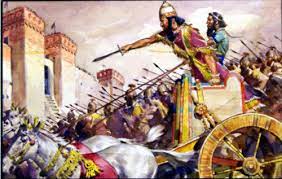Hezekiah and the Assyrians
36:1 to 37:38

With something of a jolt, the prophet calls us back to the grim realities of his own situation.129 The Assyrians were convinced that they were invincible and that the God of Isra’el was no different from any of the other gods they had overcome on their westward march. As a result, in this section, Isaiah stresses the pride of the Assyrians, and that her arrogance would result in her judgment by God. Judah had been under the Assyrian yoke ever since Chapter 7 because of the disobedience of Ahaz to the prophecy of Isaiah. Assyria’s dominance continued through Ahaz’s life and right into the fourteenth year of the reign of his son Hezekiah.
Hezekiah undertook sweeping religious reforms after he became king in the year 715 BC. He reinstituted Temple worship and did away with the high places of pagan worship. But in foreign policy, he continued the subservience of his father. The whole land, including the Philistines, was subservient to the Assyrians. But in the year 713 BC, Ashdod, one of the five Philistine cities, rebelled. When this happened, the Assyrian king, Sargon II, came down and replaced the king of Ashdod. In the year 712 BC Ashdod rebels again under Egyptian agitation and this time Mo’ab and Edom rebel with the Philistines. Once again Sargon II comes down to control things. Mo’ab and Edom surrender immediately, and Sargon II takes Ashdod. This is the background of 20:1-6. Consequently, from 7:12 onward, the Land is securely under Assyrian domination. As I pointed out earlier, Hezekiah’s government had a pro-Egyptian and pro-Assyrian element. The pro-Egyptian element was pushing for an alliance with Egypt against the Assyrians. Isaiah opposed this rebellion against Assyria as seen in the prophecies of Chapters 28 to 35.
In the year 705 BC Sargon II died and Sennacherib became king. Hezekiah probably reflected the anti-Assyria discontent of many in the nation. As a result, Hezekiah, encouraged by unrest all over the Assyrian empire, seemed to have joined a coalition of states in open rebellion. He not only joined the revolt against the Assyrians; he led it. This was in direct disobedience to the prophecy of Isaiah (2 Kings 18:7). As Hezekiah joined the revolt, with Egyptian backing, alliances were made with both Edom and Mo’ab. The city of Gaza refused to join the revolt, so Hezekiah took the city and settled it with Judeans (Second Kings 18:8). Hatti, the king of Eckron, another Philistine city, refused to join the revolt, although the citizens of Eckron wished to join the revolt. As a result, Hatti was deposed by the citizens and turned over to Hezekiah, who had Hatti imprisoned in Jerusalem. Much of this information comes from the Assyrian records. But we do have parallel accounts between the biblical account and the Assyrian account on what happened in the fourteenth year of Hezekiah’s reign. The historical narrative in these chapters is mirrored in 2 Kings Chapters 18 and 19.
With the rebellion in motion, Hezekiah began to prepare for an extensive siege. He plugged up all the available water sources outside of Jerusalem so the onslaught of Assyrians could not use them. In addition, he diverted water from an underground spring into the Pool of Salome within the walls of Jerusalem. This underground tunnel, which became known as Hezekiah’s Tunnel, extended for about a half a mile. In doing this he hid away Jerusalem’s main water supply and denied its access to the Assyrians. This tunnel is mentioned in Second Kings 20:20 and Second Chronicles 32:30. Archaeologists have since discovered it.
Anytime we knowingly go against the word of ADONAI, we put ourselves at risk. Like a loving Father, ADONAI has our best interests at heart. His discipline is to protect us, not withhold good things from us. The lie of the Adversary is that God is holding out on us. After all, we can handle it. We don’t need Him. This was the lie in the Garden of Eden. And it always ends up the same. Once we are separated from His protection, we end up in trouble.



Leave A Comment